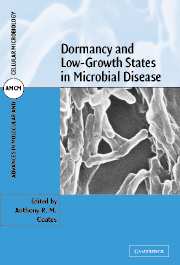Book contents
- Frontmatter
- Contents
- Contributors
- Preface
- 1 Physiological and molecular aspects of growth, non-growth, culturability and viability in bacteria
- 2 Survival of environmental and host-associated stress
- 3 Surviving the immune response: an immunologist's perspective
- 4 Quantitative and qualitative changes in bacterial activity controlled by interbacterial signalling
- 5 Mechanisms of stationary-phase mutagenesis in bacteria and their relevance to antibiotic resistance
- 6 Biofilms, dormancy and resistance
- 7 Tuberculosis
- 8 Gastritis and peptic ulceration
- 9 Resumption of yeast cell proliferation from stationary phase
- 10 Resting state in seeds of higher plants: dormancy, persistence and resilience to abiotic and biotic stresses
- Index
- Plate section
8 - Gastritis and peptic ulceration
Published online by Cambridge University Press: 18 August 2009
- Frontmatter
- Contents
- Contributors
- Preface
- 1 Physiological and molecular aspects of growth, non-growth, culturability and viability in bacteria
- 2 Survival of environmental and host-associated stress
- 3 Surviving the immune response: an immunologist's perspective
- 4 Quantitative and qualitative changes in bacterial activity controlled by interbacterial signalling
- 5 Mechanisms of stationary-phase mutagenesis in bacteria and their relevance to antibiotic resistance
- 6 Biofilms, dormancy and resistance
- 7 Tuberculosis
- 8 Gastritis and peptic ulceration
- 9 Resumption of yeast cell proliferation from stationary phase
- 10 Resting state in seeds of higher plants: dormancy, persistence and resilience to abiotic and biotic stresses
- Index
- Plate section
Summary
THE DISCOVERY OF THE BACTERIAL CAUSE OF GASTRITIS
Prior to the discovery of Helicobacter pylori, gastritis and peptic ulceration were considered not to have a bacterial origin. This changed in April 1982, when spiral bacteria that had been observed on the gastric mucosa by Warren were cultured for the first time in the Microbiology Department of Royal Perth Hospital, Western Australia, when the author (CSG) was head of the department (31). We noted that “in old cultures coccoid bodies appeared.” These coccoid forms are now thought to be the dormant phase of H. pylori. Among 100 patients biopsied in that study, those with gastritis and a duodenal ulcer yielded a growth of H. pylori. Thus when Marshall and Warren studied the medical notes, they realised that gastritis and peptic ulceration might have a bacterial origin (32).
From Campylobacter pyloridis to H. pylori
The first name given by the author to these gastric spiral bacteria was Campylobacter pyloridis (31). However, after six years of intensive bacteriological work by the author's research team in Western Australia, it was shown that Campylobacter pyloridis should be in a new genus, which he named Helicobacter. In 1989, in conjunction with other microbiologists in Queensland, Australia and in England, he published the new genus name; the first two species were Helicobacter pylori, the human stomach pathogen, and Helicobacter mustelae, the stomach pathogen of the ferret (20).
- Type
- Chapter
- Information
- Dormancy and Low Growth States in Microbial Disease , pp. 209 - 222Publisher: Cambridge University PressPrint publication year: 2003

